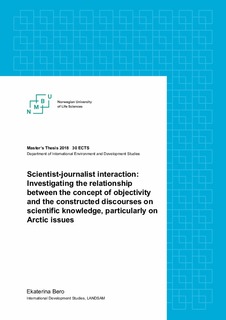| dc.description.abstract | The Arctic represents a geographical region where political and economic interests of some countries conflict with global environmental concerns. However, the media are argued to misrepresent the complexity of Arctic issues. Journalists tend to frame the Arctic as a place of potential political conflicts, while the Arctic countries intend to preserve peace and cooperation, according to their official strategies. Covering scientifically complex issues, journalists might ignore scientific uncertainties, and frame scientific claims as uncertain. Media misrepresentation of
scientific knowledge might happen for two reasons. First, contrasting values inherent to science, and journalism complicate scientist-journalist interaction. Second, both science and journalism experience intrusion of external interests, e.g. science might be forced to follow interests of stakeholders who fund scientific research, whereas journalism experience public expectations of discovering ‘the truth’. To explore if scientists and journalists manage to remain objective in the changing conditions of their professions, this thesis analyses how constructed discourses on the Arctic influenced, and were influenced by, the norm of objectivity practiced among Norwegian scientists and journalists. This thesis combines Fairclough’s (1992) three-dimensional framework, and Douglas’ (2004) conceptual framework of objectivity. Fairclough’s framework allows to conduct a comprehensive analysis of texts, text production, and social practice of journalistic reporting. Douglas’ multifaceted understanding of objectivity helps this explorative study to accommodate diverse meanings of objectivity among scientists and journalists. This thesis analysed 26 newspaper articles published from 1 January 2018 to 31 October 2018 in four Norwegian newspapers. In addition, 5 individual semi-structured interviews with Norwegian scientists and journalists were conducted. This thesis concluded that the discourses emerging from the sampled articles, and the norm of objectivity have mutually influenced each other. Framing the scientific knowledge as well-established, and quoting only supporters of the global warming hypothesis allowed journalists to compromise convergent and concordant meanings of objectivity. However, a changing understanding of objectivity most likely developing among Norwegian journalists has also
influenced the ways the discourses were constructed. If objectivity is traditionally understood as a balanced representation of proponents and opponents in one article, Norwegian journalists feel more comfortable with taking a stance on climate-change issues, believing that balance would be reached “over time”. | nb_NO |

